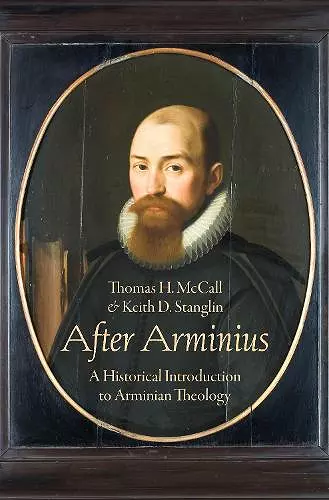After Arminius
A Historical Introduction to Arminian Theology
Keith D Stanglin author Thomas H McCall author
Format:Hardback
Publisher:Oxford University Press Inc
Published:11th Dec '20
Should be back in stock very soon
This hardback is available in another edition too:
- Paperback£31.99(9780190874209)

Inspired by the ideas of the Dutch theologian Jacob Arminius, Arminianism was the subject of important theological controversies in the seventeenth and eighteenth centuries, and still today remains an important position within Protestant thought. What became known as Arminian theology was held by people across a wide swath of geographical and ecclesial positions. This theological movement was in part a reaction to the Reformed doctrine of predestination and was founded on the assertion that God's sovereignty and human free will are compatible. More broadly, it was an attempt to articulate a holistic view of God and salvation that is grounded in Scripture and Christian tradition as well as adequate to the challenges of life. First developed in European, British, and American contexts, the movement engaged with a wide range of intellectual challenges. While standing together in their common rejection of several key planks of Reformed theology, supporters of Arminianism took varying positions on other matters. Some were broadly committed to catholic and creedal theology, while others were more open to theological revision. Some were concerned primarily with practical matters, while others were engaged in system-building as they sought to articulate and defend an over-arching vision of God and the world. The story of Arminian development is complex, yet essential for a proper understanding of the history of Protestant theology. The historical development of Arminian theology, however, is not well known. In After Arminius, Thomas H. McCall and Keith D. Stanglin offer a thorough historical introduction to Arminian theology, providing an account that will be useful to scholars and students of ecclesiastical history and modern Christian thought.
Our authors have brought their considerable theological and historical gifts to bear on the production of the standard scholarly work on the historical development of Methodist theology and have provided readers with a fresh consideration of Remonstrant soteriology. * J. Matthew Pinson, Welch Divinity School, Gallatin, TN, International Journal of Systematic Theology *
Until recently, scholarship has suffered from a dearth of historically contextualized, doctrinally nuanced studies of Arminianism. Richard Muller and others have developed sophisticated analyses of the Reformed tradition, which get behind blunt terms such as 'Calvinism' in order to highlight the variegated nature of Reformed theology. McCall and Stanglin have harnessed this approach and applied it to the Arminian tradition in a skilful and timely manner ... a valuable contribution * Andrew J. Ollerton, Wesley and Methodist Studies *
an introduction which aims to enable future scholarship ... well-made and illuminating. * Judith Rossall, Proceedings of the Wesley Historical Society *
Drs. Stanglin and McCall deserve highest commendations for this comprehensive and judicious overview. Addressing the compendium of this theological tradition requires superlative historical research that spans 400 years, as well as theological and philosophical insight into the vagaries and complexities of theological change. To be sure, secondary source citations are to be found here, but what strikes the reader is the degree to which these authors are acquainted with the original Latin and Dutch sources - giving nuance seldom found in such surveys. Stanglin and McCall have removed the excuse for scholars to resort to previously common theological caricatures of Arminius and his successors in all their theological expressions. * W. Stephen Gunter, Ph.D., author of Arminius and His 'Declaration of Sentiments': An Annotated Translation with Introduction and Theological Commentary *
Stanglin and McCall have produced a worthy sequel to their Jacob Arminius: Theologian of Grace. In this important work they trace out the patterns of Arminian theology in the continental Remonstrant followers of Arminius and in British and North American Methodist Arminianism, depicting in a careful and compelling manner the rich history of Arminianism. The presentation of trajectories of Arminian thought in America from the eighteenth through the nineteenth century is of particular importance for the retrieval and reception of what has been a largely and unjustly neglected tradition in American theology. This is a fine work that sets a high standard for future writing in this field. * Richard A. Muller, P. J. Zondervan Professor of Historical Theology, Emeritus, Calvin Theological Seminary *
McCall and Stanglin have produced an impressive work, thoroughly researched, and well referenced, covering several centuries from the initial Remonstrant doctrines of Episcopius and, later, Limborch, through to Watson, Pope, Bowne and Miley, among others, who revised Arminian thought in the nineteenth century. Any student of Methodist history in need of instruction in Arminian theology would do well to place this book at the top of their reading list. * Robert Schofield, Journal of Ecclesiastical History *
ISBN: 9780190874193
Dimensions: 159mm x 241mm x 21mm
Weight: 549g
294 pages